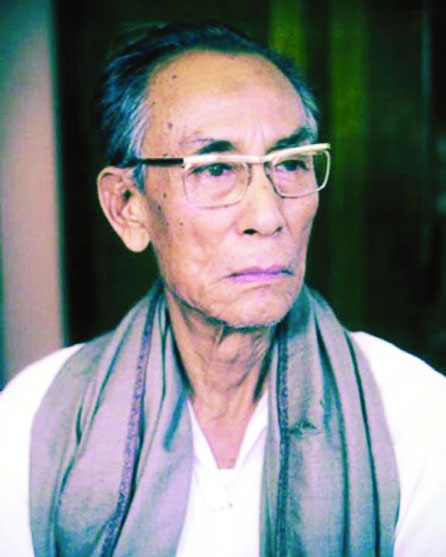Singer, music director, and composer SD Burman’s musical contribution to Bollywood still remains fresh in everybody’s minds. His creativity has stood the test of time.
An artiste lives through his creations and those who are exceptional, get immortalised. SD Burman, dada, as he is referred to, belonged to the latter category. It is now more than four decades that we lost him but his music of the fifties and sixties still appears to have a flavour of effervescent youthful bounce. It was the genius in him that despite the obvious generational gap, his musical scores have retained an element of contemporary freshness.
Comparatively a late comer to Mumbai, as he was already in his late thirties, his knowledge of Bangla folk and Rabindra Sangeet, coupled with his flexibility and innovativeness, helped him establish himself. Very soon, he was being counted in the front ranks alongside Naushad, Ghulam Mohammad and Khemchand Prakash. Not averse to taking risks, dada as he was affectionately called, was looking for a new voice and found one, by chance, in his neighbourhood.
Geeta Ghosh Roy Chaudhary (later Geeta Dutt), whom he had seen in a chorus song, was given a break in 1947 where she sang for Kamini Kaushal on screen for Do Bhai. The song mera sundar sapna beet gaya was an instant rage and from then on there was no looking back. Later, dada was to make ample use of the husky voice of Geeta Roy to give many more memorable melodies .
Always yearning for something new and experimental, dada was looking for a lyricist for Naujawan in 1950, when he found Sahir who was yet to establish himself in Mumbai. Serendipitously, after her debut in Mahal in 1949 and later on Barsat, Lata Mangeshkar was taken on board for Naujawan.
This combination of three geniuses —dada, Sahir and Lata — produced an immortal composition thandi hawayein. The music of this song is such that it lends to the lyrics an atmosphere of breeziness. Till date, it remains one of the best and favourites of Lata. In fact, later, several composers took up and adopted the shades of this very popular tune in their own compositions .
The successful association of Sahir with dada, which began with Naujawan, continued for 17 more films, giving one hit after another, like Jaal, Baazi, Devdas, Taxi Driver, Munimji, House No 44, Pyasa, among others. But with two temperamental and sensitive artistes, who considered themselves the masters of their craft, coming together, some sparks were bound to fly. For Baazi, tadbeer se bigdi hui was written by Sahir in a mujra — ghazal style — but dada had other ideas. He composed this into a very peppy tune with Western-style beats. Sahir protested and wanted to quit but a compromise was brokered by Guru Dutt. Ultimately, Sahir relented and acknowledged the genius of dada when this song became a hit and virtually took Baazi to glorious heights.
Sahir was very passionate about his poetry and for Pyasa in 1957, he wanted dada to compose music to his lyrics. Besides this, he wanted to be paid more than the music Director, though usually, it is the other way around. Even though initially adamant, dada relented to Sahir’s terms but thereafter, never worked with him again. This led to a crisis and Guru Dutt for Kagaz ke phool had to give a break to Kaifi Azmi while retaining dada.
Scion of a princely state, dada was always very choosy, temperamental and uncompromising. This often led to tiffs with other artistes, including Lata. A minor misunderstanding over a re-recording led to their parting of ways for six years till she came back with him in 1963 to sing for Bandini, which was also the debut vehicle for Gulzar as a lyricist.
Even Kishore Kumar considered his success largely to the mentoring and patronage of dada who projected him as the voice of Dev Anand in the fifties when Kishore was absolutely raw.
His deep understanding of the musical notes gave him the flexibility to adopt Western-style as early 1954 in Taxi Driver, where he made good use instruments, like the trumpet and the bongos.
On the other hand, his use of the tabla played by Pandit Santa Prasad in nache man mora magan from meri soorat teri ankhen, is one of the best expositions of Indian classical music in Bollywood. Dada’s sonorous voice with a high intone was perhaps ideally suited only for a background score where he made full use of Rabindra sangeet and gave us some classic compositions. His power was such that when one listened to his compositions with eyes closed one would actually be living the moment with them. Who can forget not being on a river bank steering a boat while listening to mere sajan hain us paar, mein is paar….
Recognising his immense contribution to the field of music and cinema, he was conferred with the Padma Shri and later on a postage stamp and a first day cover was also brought out in his honour. Sadly, like many other dada too became a victim of Bollywood politics and got only two Filmfare awards — first in 1954 for Taxi Driver and then in 1973 for Abhimaan. His compositions of Guide, Aradhana and Jewel Thief, besides numerous others, were all overlooked. Perhaps a true genius like him never needed any awards. For him, the most important thing was the adulation and affection of the public which he got in ample measure.
Writer: KK Paul
Courtesy: The Pioneer








 OpinionExpress.In
OpinionExpress.In















Comments (0)